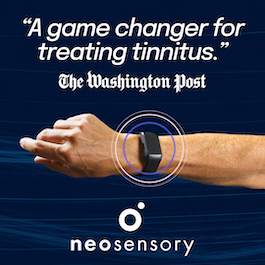|
www.HealthyHearing.com |
I have tinnitus. Here's how I get a good night’s sleep.Part 2 of Sleeping Well With Tinnitus
Contributed by Glenn Schweitzer If you talk to enough people who have chronic tinnitus, one thing becomes clear quickly: It’s a challenge to get a good night sleep when you live with constant ringing in your ears. In the dark stillness and quiet of the bedroom, tinnitus takes center stage night after night, and it can quickly turn your life into a living nightmare. Note: If you have not read Part 1 of my Sleeping Well With Tinnitus series—Tinnitus keeping you up at night? Try these 11 tips—I encourage you to pause here to read it first, as it covers important basic strategies such as sound masking, brainwave entrainment, and improving sleep hygiene. 
I should know: I’ve lived with loud tinnitus for the last 13 years, and when it first started, I nearly stopped sleeping entirely. And as someone who now coaches others to live with the condition, I know sleep disturbances are often one of the most challenging and frustrating aspects of living with tinnitus, because it creates a vicious cycle where a lack of sleep only worsens the condition, making sleep even more difficult the next night. The good news? This is a solvable problem. Getting better sleep is not only possible but essential to the habituation process, which is key to finding lasting relief from tinnitus. Whether your challenge is falling asleep, staying asleep, or both, with the right tools, strategies, and a little bit of effort, you can fix your sleep issues–no matter how severe your tinnitus may seem right now. In this article, I’ll introduce six new tools and techniques to help you improve your sleep with tinnitus, based on my experience of having the condition and helping others. Ujjayi Breathing – The best breathing technique for falling asleep you’ve never heard ofThis yoga breathing technique is not widely known, but it is one of the most powerful techniques for falling asleep that I have ever come across. In my experience, it can induce a feeling of sedation and sleepiness much faster and more effectively than any other breathing technique. 
Ujjayi breathing involves deep, slow breaths through the nose, where the back of your throat is gently constricted to create a soft, ocean-like–or more accurately snoring-like–sound. The rhythmic sound helps to both focuses your attention away from external distractions (like tinnitus) and sends a signal to your nervous system that it’s time to relax. There is a small learning curve to this technique as it can be somewhat confusing to learn to breathe through the throat constriction. But once you get it, it’s easy.
Helpful guided instructions can be found here. Cognitive shuffling technique for rapid sleep inductionCognitive shuffling is a sleep induction technique developed by Canadian cognitive scientist Dr. Luc Beaudoin. It’s designed to gently shuffle your thoughts in a way that prevents rumination and anxiety – two big factors that can make it more difficult to fall asleep with tinnitus. The goal is to engage your mind just enough to distract it from racing thoughts or the constant noise of tinnitus, without triggering stress or focus that might keep you awake. These are the basic steps:
Helpful tips: Inhale deeply as you think of the next word. Exhale slowly as you bring up the mental image for that word. If negative thoughts enter your mind, simply come back to the exercise and begin again. CBTi – Retraining your mind for better sleepCognitive behavioral therapy for tinnitus is an effective tool for reducing anxiety related to chronic symptoms. Similarly, CBT for insomnia (CBTi) is an effective, evidence-based, and drug-free approach to treating chronic sleep problems. With CBTi, the goal is to address the root causes of your insomnia by helping you change negative thought patterns and behaviors that interfere with your ability to sleep. CBTi focuses on two primary areas of concern: cognitive restructuring and behavioral interventions. Cognitive restructuring involves helping patients to identify, challenge, and reframe negative and distorted thoughts and beliefs about sleep, such as “I will never be able to sleep when my tinnitus is this loud!” Cognitive restructuring techniques can help to reframe these thoughts into something more realistic and positive such as, “Even with tinnitus this loud, I can learn techniques to sleep better.” This can help to reduce anxiety and improve your mindset around sleep. On the behavioral side of things, CBTi emphasizes establishing good sleep habits through techniques and strategies such as:
CBTi training can take time to see results, but it’s a highly effective option for tinnitus sufferers. If you want to try CBTi, here are some excellent apps and resources:
Supplements I’ve found usefulDisclaimer: I am not a doctor or medical professional. Always consult with your doctor before trying any new medication or supplement. Magnesium – An important mineral for stress managementMagnesium is a crucial mineral for many bodily functions, including stress and sleep regulation. For tinnitus sufferers, the calming effects of magnesium are especially helpful, as low levels of magnesium are linked to poor sleep quality and increased levels of stress, both of which can increase tinnitus distress. By boosting your magnesium levels through supplementation, you support the body’s natural ability to relax, possibly making it easier to both fall asleep and stay asleep. Look for magnesium supplements with high bioavailability, like magnesium glycinate, aspartate, malate, threonate, or orotate, and typical doses range from 400-800mg daily, best taken in the evening. Note: Magnesium supplements should not be taken by anyone with compromised kidney function. They also should not be taken with calcium supplements or dairy products, as magnesium can interfere with calcium absorption. Valerian Root – An ancient natural remedy for better sleepValerian root has been used for thousands of years as a natural remedy to address anxiety, nervousness, and sleep issues. Today, it is most commonly used to improve sleep quality and can be very effective for people suffering from tinnitus-related insomnia as it can help to induce drowsiness while also reducing anxiety and tension, both of which can heighten awareness of tinnitus. Valerian root is not considered habit-forming and is widely available in tinctures, capsules, and extracts. I personally prefer valerian root extract tinctures, such as this one offered by Maxx Herbs, which allows for much more precise dosing. Note: Valerian root may negatively interact with alcohol, as well as with many common prescription and over-the-counter medications. Cannabinol (CBN) – The best cannabinoid for better sleepCannabinol (CBN) is a non-intoxicating cannabinoid derived from the cannabis plant, known for its mild sedative properties, which has made it an increasingly popular natural sleep aid. Unlike THC (the active ingredient in marijuana), CBN won’t make you feel high, but its calming effects can help tinnitus sufferers improve sleep quality. CBN products, such as tinctures, capsules, and gummies, are widely available and often combined with CBD to enhance relaxation without intoxication. Many people – myself included – find CBN highly effective as an occasional sleep aid, but it doesn’t work for everyone, and individual results will vary. It’s always important to start with a low dose and increase gradually. Note: CBN may interact with common prescription and over-the-counter medications. Consuming CBN may also trigger a false positive result for THC on drug tests. Hemp-derived CBN products are federally legal in the US under the 2018 Federal Farm Bill, but always check all local and state laws before purchasing. Final thoughtsTinnitus can be an overwhelmingly difficult problem, even when you’re getting adequate sleep. But when your ringing keeps you up at night, it becomes a much bigger challenge, and it can be hard to break out of the vicious cycle. Improving your sleep habits is an essential part of managing tinnitus distress and finding relief. And while not every idea in this post will work for every tinnitus patient, I hope you will explore some of these strategies and tools. No matter what your tinnitus sounds like, you are closer to a good night sleep than you realize. With the right strategies in place, restful, restorative sleep is always within reach. Glenn Schweitzer
|
Featured clinics near me
Hearing Health Solutions from Ohio ENT - Columbus
974 Bethel Rd Ste B
Columbus, OH 43214
Earzlink Hearing Care - Reynoldsburg
7668 Slate Ridge Blvd
Reynoldsburg, OH 43068


Find a clinic
We have more hearing clinic reviews than any other site!


 Glenn Schweitzer is an entrepreneur, blogger, and the author of Rewiring Tinnitus and Mind over Meniere’s. He is passionate about helping others who suffer from tinnitus and vestibular disorders and volunteers as an Ambassador Board Member for the Vestibular Disorders Association (VEDA). Through his blogs, he continues to raise awareness for tinnitus, Meniere’s disease, and other vestibular disorders, spreading his message of hope to those in need.
Glenn Schweitzer is an entrepreneur, blogger, and the author of Rewiring Tinnitus and Mind over Meniere’s. He is passionate about helping others who suffer from tinnitus and vestibular disorders and volunteers as an Ambassador Board Member for the Vestibular Disorders Association (VEDA). Through his blogs, he continues to raise awareness for tinnitus, Meniere’s disease, and other vestibular disorders, spreading his message of hope to those in need.